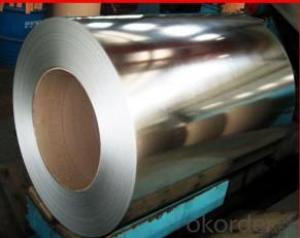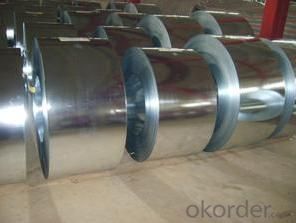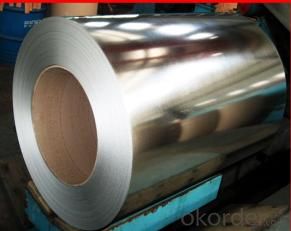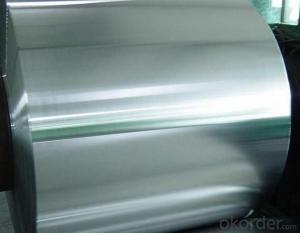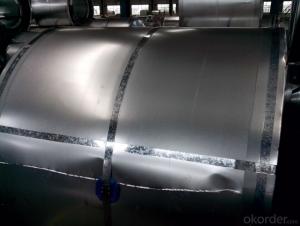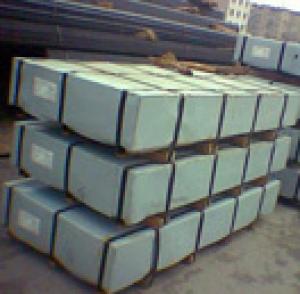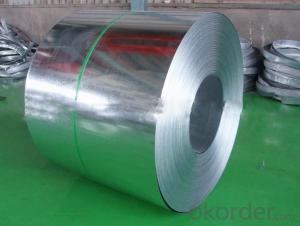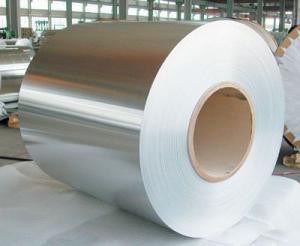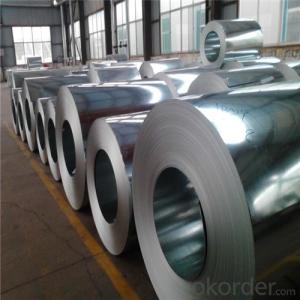Hot Dipped Galvanized Steel Coil/GT00818
- Loading Port:
- Shanghai
- Payment Terms:
- TT OR LC
- Min Order Qty:
- 30 m.t.
- Supply Capability:
- 10000 m.t./month
OKorder Service Pledge
OKorder Financial Service
You Might Also Like
Basic Info.
Model NO.:GT00818
Surface Treatment:Galvanized
Additional Info.
Packing:At buyer′s requirement
Standard:GB,JIS,ASTM
Origin:CHINA
HS Code:72123000
Production Capacity:50,000 mt/year
Product Description
Commodity: Hot dipped galvanized steel coil
Size: Thickness: 0.20mm to 1.2mm; Width: 500mm to 820mm
Surface finish: Regular spangle; Small spangle
Surface treatment: Chromated passivation
Zinc coating: Z08, Z12, Z18
Packing: Mill's standard packing for exporting
Usage: used in the industries such as construction ,cold rolling forming and electro mechanics manufacturing, household electric appliance manufacturing and etc
Standard adopted: GB/T2518-1998;Also we supply such steel strips according to JIS,ASTM standard to meet users'requirements.
Steel grade: Q195,Q195L,SPCC(Other material require agreement )
Equivalent standard: JIS G3302 1998 or ASTM A653M/A924M 1998
Price Terms: FOB, CIF Term
Payment Terms: T/T, L/C at sight
Delivery: 15 days after receiving your valid L/C/down payment
- Q: What are the different types of coil leveling machines?
- There exists a variety of coil leveling machines utilized in different industries. Some frequently encountered types are as follows: 1. Precision Roll Levelers exhibit exceptional accuracy and possess the capability to precisely level coils. Employing a series of rolls, these machines apply pressure to eliminate any distortions or imperfections in the coil. 2. Straighteners are utilized to flatten coils that have become curved or warped during the manufacturing process. Typically, they consist of a set of rollers that gradually bend the coil in the opposite direction to restore its flatness. 3. Rotary Levelers are employed to level thicker coils or those with a higher yield strength. These machines employ a series of rolls that rotate in opposite directions, exerting pressure to flatten the coil. 4. Tension Levelers are commonly used to level thin-gauge coils. They function by applying tension to the coil while passing it through a series of rollers. This process effectively removes any waviness or unevenness in the coil. 5. Stretch Levelers are specifically designed for leveling coils made of high-strength materials. These machines employ a combination of stretching and bending to eliminate any irregularities on the coil's surface. 6. Cut-to-Length Lines not only level the coil but also cut it into specific lengths according to the customer's requirements. These machines are commonly utilized in precision-demanding industries like automotive or construction. In conclusion, the choice of coil leveling machine depends on factors such as the type and thickness of the coil, desired level of accuracy, and the intended application of the leveled coil.
- Q: I'm a hiker and cook on a camp fire with a canteen cup. So which would be a better material for cooking on a campfire with, aluminum or stainless steel?
- Stainless steel and as to the soot problem, it isn't. Black absorbs heat faster, so if you let the pan get blackened it will heat up better for you. Most people used cast iron for campfire cooking and it was black and worked well. Trouble with cast iron is it weighs and ton and not good for hiking with.
- Q: I bought a damascus steel knife. It will be used for display. Nothing like hunting/skinning. If It is just sitting around, will it rust? (assuming that it isn't getting wet) Thanks for the help.
- Damascus Steel Rust
- Q: Does anyone know the lyrics to steel driving man by Dailey and Vincent. I would really appreciate it
- I okorder /
- Q: How are steel coils used in the manufacturing of agricultural silos?
- Steel coils are used in the manufacturing of agricultural silos by being formed and shaped into corrugated sheets, which are then assembled into the walls of the silo. The strength and durability of the steel coils ensure that the silo can withstand the weight of the stored grains and withstand external pressures.
- Q: How are steel coils used in the manufacturing of fasteners?
- Steel coils are used in the manufacturing of fasteners as they provide a continuous and reliable source of raw material. These coils are typically processed through a series of steps, including cutting, shaping, and forming, to create various types of fasteners such as bolts, screws, and nails. The high strength and durability of steel make it an ideal material for fasteners, ensuring their performance and longevity in a wide range of applications.
- Q: How are steel coils used in the production of steel connectors?
- Steel coils are used in the production of steel connectors as they serve as the primary raw material. The coils are unrolled and then processed through various manufacturing techniques, such as cutting, stamping, and bending, to shape them into the desired connector forms. These connectors are crucial components used to join different steel structures together, ensuring strength, stability, and structural integrity in various applications like construction, automotive, and engineering industries.
- Q: How are steel coils used in the production of roofing sheets?
- Steel coils are an essential component in the production of roofing sheets. These coils are typically made from high-quality steel, which is known for its durability, strength, and resistance to corrosion. They undergo a series of processes to transform them into roofing sheets. Firstly, the steel coils are loaded onto a machine called a decoiler, which unrolls the coils and feeds them into the production line. This machine ensures a continuous supply of steel for the manufacturing process. Next, the steel coils pass through a series of rollers, which shape the steel into the desired profile for the roofing sheets. These rollers can create various profiles, such as corrugated or standing seam, depending on the specific requirements of the roofing project. After the shaping process, the steel sheets are often coated with protective layers to enhance their durability. This coating can be in the form of zinc or other metallic alloys, known as galvanized or galvalume coatings, respectively. These coatings provide an additional layer of protection against rust and corrosion. Once the sheets are coated, they are typically cut to the desired length and width. This can be done using shearing machines or other cutting tools, ensuring that the roofing sheets are sized correctly for installation. Finally, the roofing sheets are packaged and prepared for distribution to construction sites. They are often bundled together and securely wrapped to protect them during transportation. In summary, steel coils are crucial in the production of roofing sheets. They undergo shaping, coating, cutting, and packaging processes to transform them into finished products ready for installation. The use of steel coils ensures that roofing sheets are strong, durable, and resistant to various environmental factors, making them a popular choice for roofing applications.
- Q: How are steel coils used in the manufacturing of seat belts?
- Steel coils are used in the manufacturing of seat belts as they provide strength and durability to the webbing material. These coils are typically inserted within the seat belt fabric to enhance the belt's ability to restrain occupants during a collision. The steel coils absorb and distribute the force exerted on the seat belt, ensuring it can withstand high impact forces and provide reliable protection to passengers in vehicles.
- Q: Specifically, for the main support beam found in a basement.
- Steel is better. You can use a smaller size compared to wood, it will handle more weight and will not deflect like a lam beam can and will. I've worked in a lot of older houses and the ones with steel beams always had far less differential settling than those with wood beams.
Send your message to us
Hot Dipped Galvanized Steel Coil/GT00818
- Loading Port:
- Shanghai
- Payment Terms:
- TT OR LC
- Min Order Qty:
- 30 m.t.
- Supply Capability:
- 10000 m.t./month
OKorder Service Pledge
OKorder Financial Service
Similar products
Hot products
Hot Searches
Related keywords

